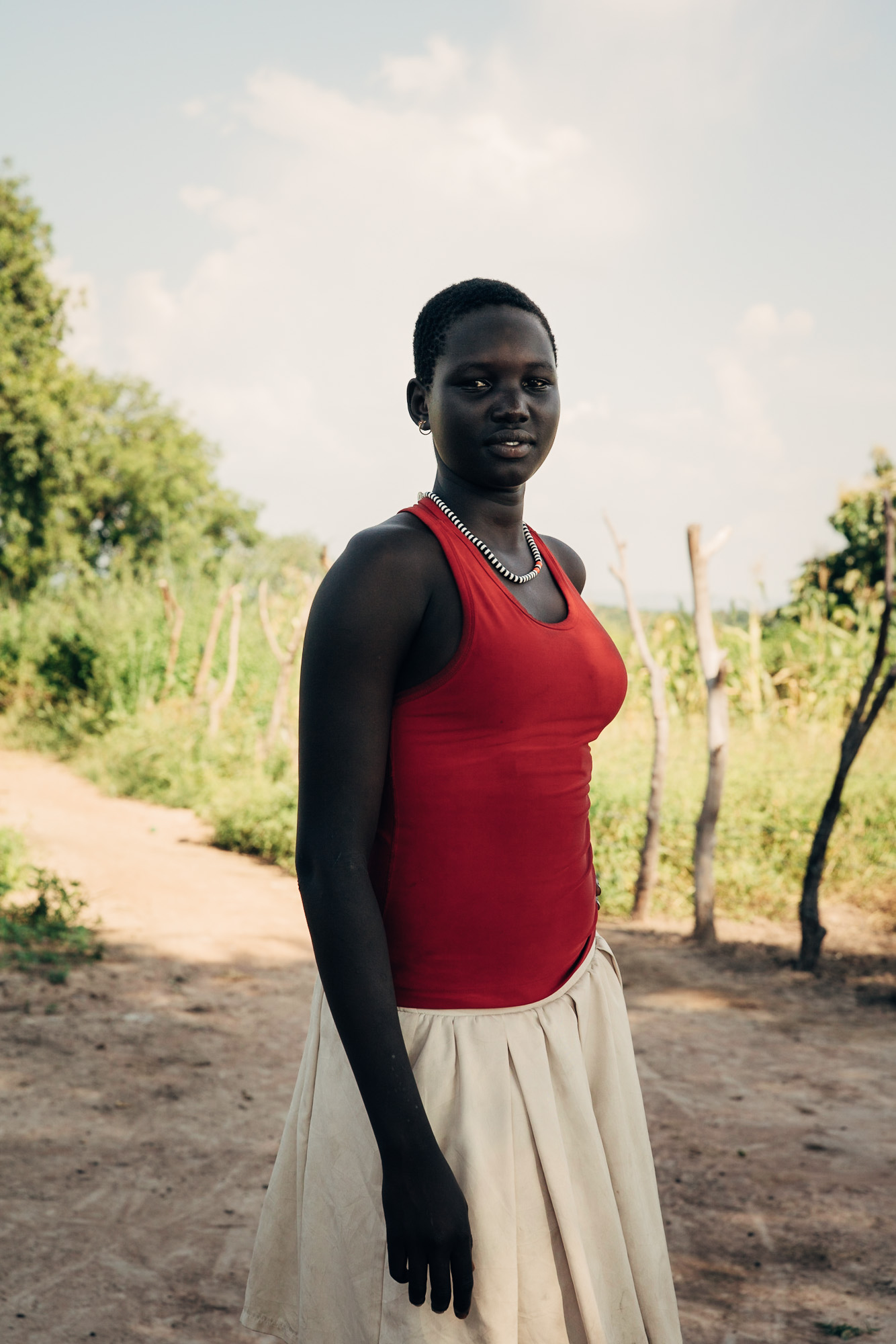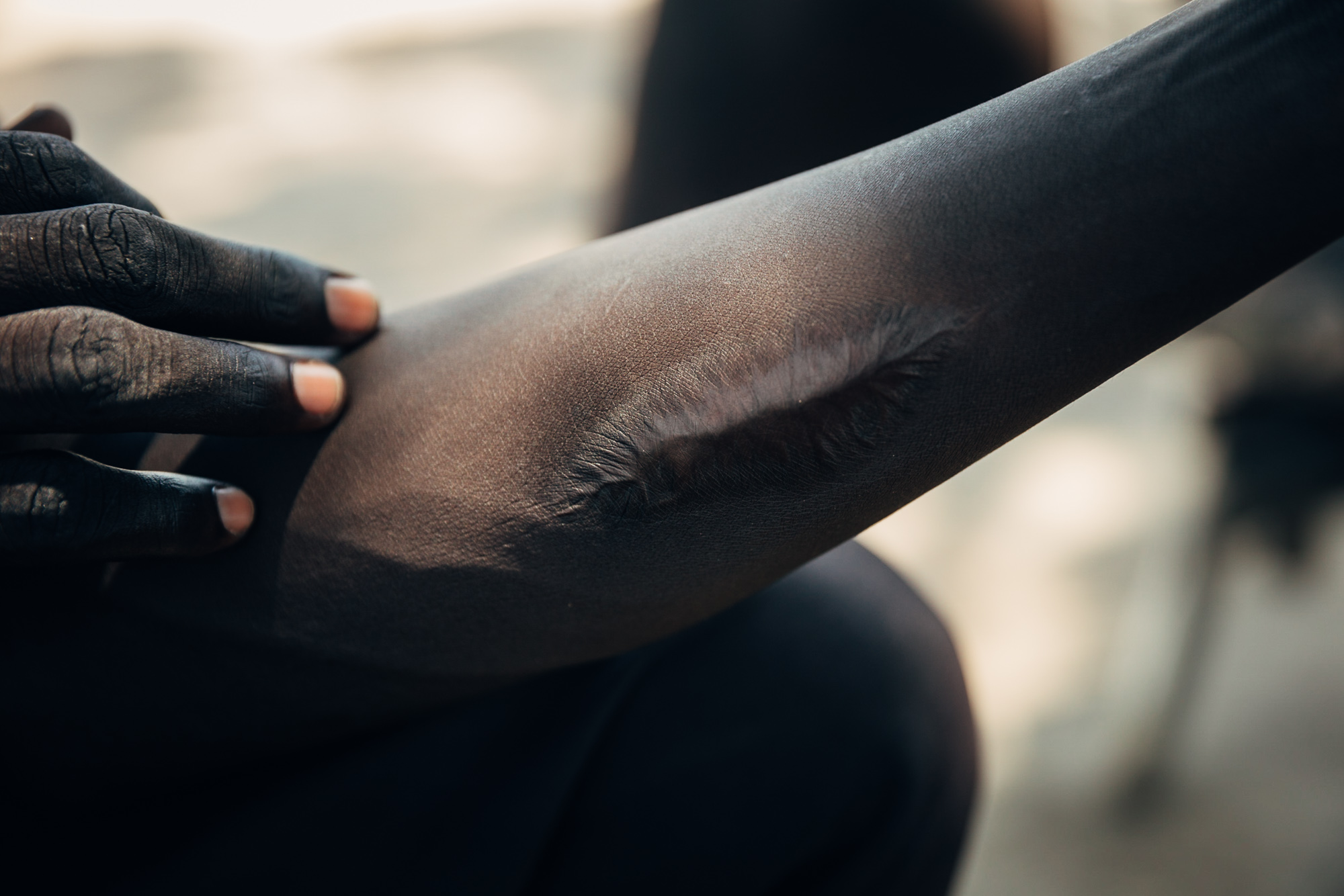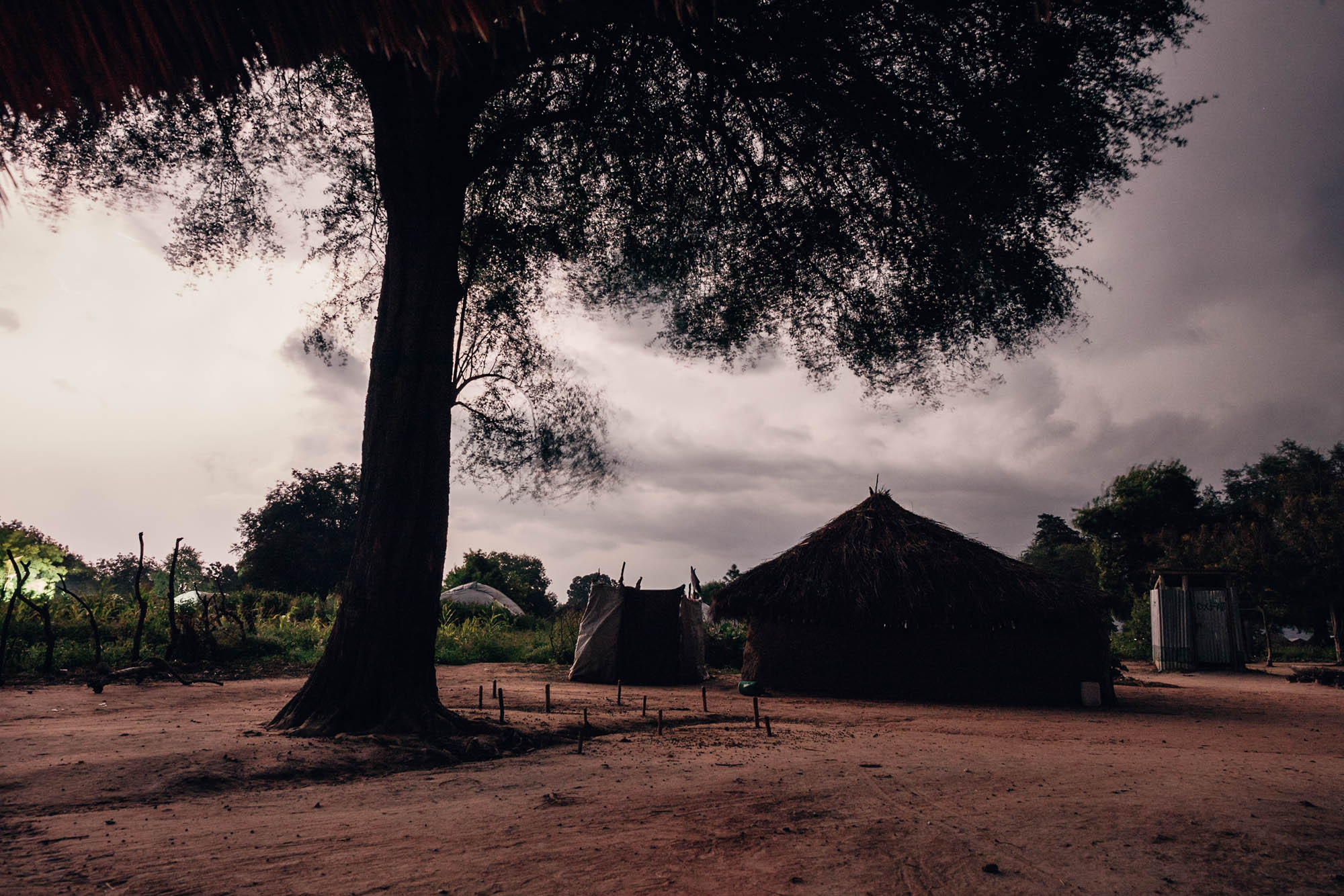Gatwich fought in the Southern Sudanese civil war for three years - today he lives as a refugee in Uganda. His neighbours? If he had shot then.
On a warm Sunday morning, a priest stands in a crumbly loam building and reads Gatwich Gany's favourite text. It is just before 9 in the Ugandan refugee settlement and the 20-year-old has dressed up, plugged the holes in his white-and-black short-sleeved shirt, combed his hair with an old scratch brush. Timidly he moves his lips.
"On the way, however, as he was already approaching Damascus, it happened that suddenly a light from heaven shone around him. He fell to the ground and heard a voice say to him: "Saul, Saul, why are you following me? He answered, "Who are you, Lord?" reads the priest.
"I am Jesus whom you are persecuting," whispers Gatwich. Gatwich knows the text inside and out, just as other people know their favourite song. Morning sun falls through the wooden sticks into the dark clay building. Illuminates the scars on Gatwich's forehead: six stripes, horizontal, parallel, spaced a little finger's breadth apart, the tribal sign of the Nuer. One day Gatwich himself wants to become like Saul to Paul. From mass murderer to missionary.
Gatwich is one of two million refugees who fled abroad from the civil war in Southern Sudan. It is the largest cross-border refugee movement in Central Africa since the genocide in Rwanda in 1994. Uganda alone has taken in one million Southern Sudanese, and hundreds more cross the border every day. People are now settling in what was once barren bush land. From a distance, it looks as if someone has arbitrarily sifted mud huts and plastic tarpaulin sheds into the barren landscape. People live here who fight each other on the other side of the border. Members of the two largest tribes in Southern Sudan, Dinka and Nuer. Perpetrators and victims. Side by side. Perhaps there is no better place to feel what the war has done to the minds of the Southern Sudanese - and how difficult it will be to reconcile them again.
Like a sandy scar, the trail runs through the Obodu settlement where Gatwich lives. To the left and right of it are mud huts with straw roofs, small plots of land marked out with dry sticks, and next to them people grow cabbage and corn. At a distance of 20 metres there are two churches, between them a well, in front of them yellow water canisters lined up in two parallel lines, on the left the Nuer women, on the right the Dinka, separated like the refugees in the camp. If you observe the people for a longer time, you will notice that hardly anyone ever crosses the invisible border. "Because they hate each other," says Gatwich. "Because they are afraid," says Ayen.
The 15-year-old stands bent over in the small mud hut. She has swapped her orange Sunday dress for the sleeveless red sports shirt. "You know", says Ayen, "sometimes I think they should have just killed me. What's a frightened girl like me doing alone in this world?". In front of her, she has placed a tin pot on the open fire with red beans inside.
Outside, the other Dinka girls she lives with have pushed the blue plastic chairs together to form a circle. Rhoda, Rebecca, Adjok with the baby in her arms, three months old, the producer has run away. "My new family," says Ayen, nods into the circle, pours bean soup into the tin bowls. The old one no longer exists.
In 2017, no one can say how many people have died in the civil war in Southern Sudan so far, that's how confusing the situation is on the ground. According to the latest estimates by United Nations observers in spring 2016, there were 50,000. 7.5 million of the 12 million inhabitants of Southern Sudan are dependent on humanitarian aid, according to the international relief organisation World Vision. Six million people do not have enough to eat.
Aya's father had known this from the beginning. "Never trust the men with the six stripes on their foreheads," he had always warned his children, the two sons, the little daughter. At that time, the family lived in Bor, capital of the southern Sudanese state of Jonglei on the White Nile, population about 300,000. In Aya's memory he had been a good father, a simple man. He was a cattle breeder, like the vast majority of Southern Sudanese who earn their money either by cattle breeding or farming. Ever since Ayen can remember, his father has fought against the foreign men from the Murle and Nuer tribes, who came and tried to steal the cows, killing their relatives. "Cattle Raiding" is what they call it in Southern Sudan. Part of an archaic tradition that was never stopped by any law. Thieves were heroes. The defendants were either dead or failures.
Nevertheless, the father was happy, just as everyone was happy when Southern Sudan finally became independent in July 2011, the youngest state in the world. After 50 years of war with the North and 1.5 million dead. Like 98 percent of the Southern Sudanese, he had voted for the secession of Khartoum. He has never fully trusted talk of nation and democracy. How could people form a unit who had been beating their heads for years over cattle and pasture land?
When war broke out in Juba on 15 December, Ayen was 11 years old. She knows nothing about politics at that time, except that President Salva Kiir is a Dinka like her and Vice President Riek Machar, whom everyone calls just Dr. Riek, a Nuer. The little girl is not surprised that the two are arguing with each other. If she had to describe the conflict in one sentence, it would be Two stubborn people fighting for power, and their tribesmen pay for it with their lives.
From 2002 on, the two generals of the Sudanese People's Liberation Movement (SPLM) had fought side by side against the Sudanese regime; when SPLM founder John Garang, a Dinka, died in a plane crash in 2005, Salva Kiir became the new head of the SPLM. When the SPLM changed from a rebel movement to a state party in 2011, Salva Kiir became the first president, Machar his dissatisfied deputy. For many Southern Sudanese this was a clear signal: Dinka first, then the Nuer and then all the rest.
The war begins as a shoot-out between the president's guards. Kiir tries to stage the shooting as a coup attempt by the Nuer. In the following days Dinka soldiers march through the city and kill about 600 Nuer in pogrom-like riots. Ten thousand fled to the UN positions. In the hours that followed, news spread throughout the country that Nuer soldiers were deserting and defecting to the SPLA-IO, the Sudan Liberation Front in Opposition, proclaimed by Riek Machar. It is no longer an internal party conflict between Salva Kiir and Dr. Riek, but a civil war between the two largest tribes: Dinka and Nuer.
"Revenge," says Gatwich, the Nuer boy from Obodu. "We all wanted revenge". When the war breaks out he is 16 years old, on television Salva Kiir talks about an attempted coup by the Nuer soldiers, on the phone his relatives from Juba tell horror stories: About Dinka, who marched murderously through the streets, murdering all the men who did not return their greetings; who raped the women; who forced the survivors to barbecue and eat their murdered tribesmen.
Gatwich was born in 1997 in Yuai, a small village in Jonglei State, 250 kilometres north of Bor. Since he can remember, his father, a cattle rancher, has taken him with his brothers and cousins to
Cow herdsmen sent to pasture. At first with a crop, later, when he was old enough, ten, eleven years perhaps, they put a Kalashnikov on him instead.
When the news from Juba arrives, the village elders call the young people together, Gatwich is there. They swear to join the "White Army". The White Army, a Nuer self-defence militia, founded in 1991. All young men with similar biographies, hardly anyone with a school-leaving certificate, all ready to go to the extreme in retaliation, the death of the tribesmen in Juba is motivation enough. Cowboys become child soldiers.
Gatwich sits in the semi-darkness of one of the mud huts in the Ugandan refugee settlement. Outside it is uncomfortably hot, almost 40 degrees, inside it is pleasantly cool. On the floor in front of him is a map, "Sudan and South Sudan", which the reporters brought back from Germany. Gatwich looks indecisively, does not understand the lines, not the signs, he has never learned to read. "Yarkwaich?", asks Gatwich, the translator points to a small dot on the map. "Faddoi? Bura?". With a shaky hand Gatwich connects the places on the map, traces the route of the White Army. Fighting, plundering, moving on. From north to south, always towards Juba, village by village, like Hannibal in Rome. "Bor?", asks Gatwech, the translator shows, the boy paints. Two thick circles around the three bold letters.
Hardly any other town has played a greater role in the recent history of Southern Sudan than Bor. 200 kilometres down the Nile from Juba. In 1983, the Sudanese General John Garang, a Dinka, and his soldiers, one of them Riek Machar, deserted, had founded the Sudan People's Liberation Front SPLM, laying the foundation for what is now the Republic of Southern Sudan. In 1991, Riek Machar and his followers had split off from John Garang and the SPLM for the first time, attacking Bor. 2000 Dinka were murdered in the process.
"Fear," says Ayen. "For the first time in my life I was really afraid, and it hasn't gone away until today. Bor is the first big city to take Riek Machar's opposition on 19 December 2013. On Christmas Eve 2013, the head of the Sudanese military announces the reconquest, four days later, Ayen's father calls his children to him. The Nuer are standing outside the city, he had heard. There should be 25,000.
In terms of weapons, the Southern Sudanese army is vastly superior to the poorly equipped young people. "Some of us had AK-47 rifles, some only knives and spears, some didn't even have shoes," says Gatwich. But the young people have the anger and thirst for revenge. And with every death, they became thirstier. "We wanted to exterminate them. When we went into the city, we shot everyone we found," says Gatwich, his eyes glistening, creepy grin on the lamblike boy's face. "Anyone with crow's feet on their forehead," says Gatwich, that's what they call the Dinka tribal markings, four scars that run radiantly from the centre of the forehead to the back. "Just like that," he says, stretching his left fist forward, operating an imaginary lever with his right. He clicks his cheeks. Tick-chack.
When it goes boom, Ayen is at the fountain. The father had sent the girl to fetch water, the well is 500 metres from the house. Ayen can no longer say how many shots there were. Fragmentary, like photos in an album, the memories have burned into her brain. Young men with big guns and football jerseys, six stripes on their foreheads, as the father had always warned, running out of the house singing. The father, the brothers, lying on the floor covered in blood, directly dead. The mother, the blood running from her mouth in agony. She herself, sitting in the room with the bodies and waiting, she doesn't know how long. Maybe it was ten minutes, maybe five hours, until the neighbour found her, grabbed her arm, fled with her to Uganda.
How many people did he kill that day? Gatwich laughs nervously. "More than my two hands have fingers," he says. "And with every dead Dinka my mood got better". No women, no children, that was the only rule, he says.
Ayen takes the map in his hand. With her index finger she drives up the course of the Nile. She falters at Bor, takes her blue biros in her hand. Next to the two thick circles she paints four crosses. Papa, Mama, the brothers, one for each of them.
In August 2015, the USA, together with the regional state organisation IGAD (Intergovermental Authority of Development), brokered a peace treaty between Kiir and Machar. The agreement was never implemented. In spring 2016, the fighting escalated again, Riek Machar fled to South Africa, where he is under house arrest. In the meantime, fighting is also taking place in the south and west of the country, which were previously considered quiet. There is hardly any of the 60 tribes in Southern Sudan who are not directly involved in the fighting. After his visit to Juba in November 2016, UN Special Envoy Adama Dieng warned that Southern Sudan was "fertile ground for genocide".
In the evening, Gatwicht sits on a blue plastic chair in front of his mud hut, next to him his friends, Ana Rio, Njapur, Gatwich Junior. In 2016 he has escaped. He says he used to be a superhero. One that women loved and the old tribesmen celebrated. As protector and liberator of the Nuer.
In Obodu, Gatwich is a nobody. Branded as a murderer whose story no one knows, yet everyone can guess - what else can a Nuer boy do in this country for three years but fight? He is an illiterate boy who never learned to read, write or do arithmetic because he was busy with cow hats and shooting practice; for whom the neighbour cooks a plate of corn slop every evening - out of pity! No one here is interested in his heroic stories, he doesn't talk about them anymore, simply leaves out the last three years when he talks about his life.
Whether he has stopped hating? No, no. Gatwich doesn't have to think long, shakes his head. "Here in Uganda, we are punished when we do something. If I was in Southern Sudan, I would kill again - if we don't kill them, they kill us," says Gatwich. Gatwich's words make you realise that hatred does not stop at the border. It is only preserved, like pus in a skin blister, with the constant danger of bursting open again.
Yet, one might think, reconciliation would be so easy. 50 metres as the crow flies from Gatwich's mud hut, Ayen lives. A girl who lost her family in Bor when Gatwich was in Bor to murder people. Could he imagine going over there, apologising to her for then, just like Saul once did? Gatwich must laugh. "Then I would admit that I did something wrong..."
That evening Ayen is sitting in front of her mud hut, just 15 years old, and yet she has seen things in her life that we cannot even begin to imagine. She knows well the boys with the stripes on their foreheads who came to the camp in 2016. She does not know their names, but she can guess their biographies. As a man I might have fought too," she says calmly, sitting upright, looking you straight in the eye. "As a woman you are always just the victim in all these fights".
Ayen doesn't know anymore when exactly she decided not to be a victim anymore. To make the best of the fact that she is the only one of her family to survive. "I am going to become a human rights lawyer", she says seriously. "so that one day the people who murder in Southern Sudan today will be punished. Without justice, we can forget reconciliation".
Text: Bartholomäus von Laffert, translated from German.
Published in News (AT) You can find the pdf here.

























